Unit 4 I used to be afraid of the dark Section A(3a-3c)课件(共24张PPT) 人教版英语九年级全册
文档属性
| 名称 | Unit 4 I used to be afraid of the dark Section A(3a-3c)课件(共24张PPT) 人教版英语九年级全册 |
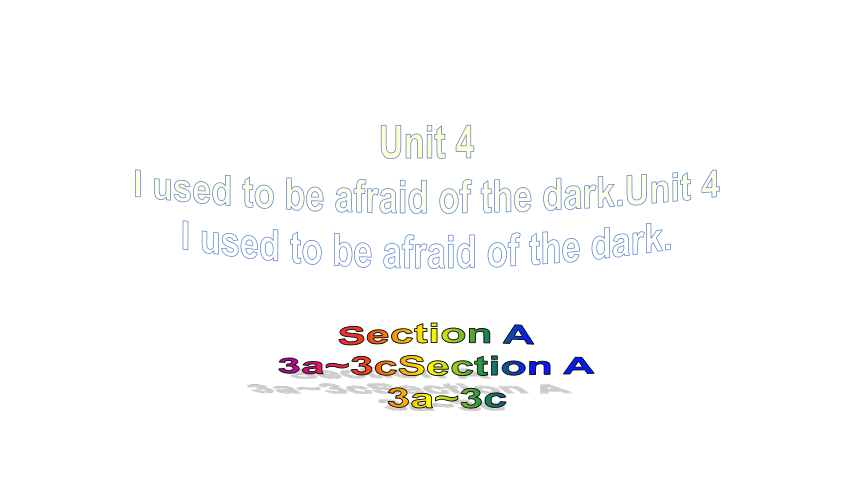
|
|
| 格式 | pptx | ||
| 文件大小 | 2.9MB | ||
| 资源类型 | 教案 | ||
| 版本资源 | 人教新目标(Go for it)版 | ||
| 科目 | 英语 | ||
| 更新时间 | 2024-09-29 07:34:59 | ||
图片预览

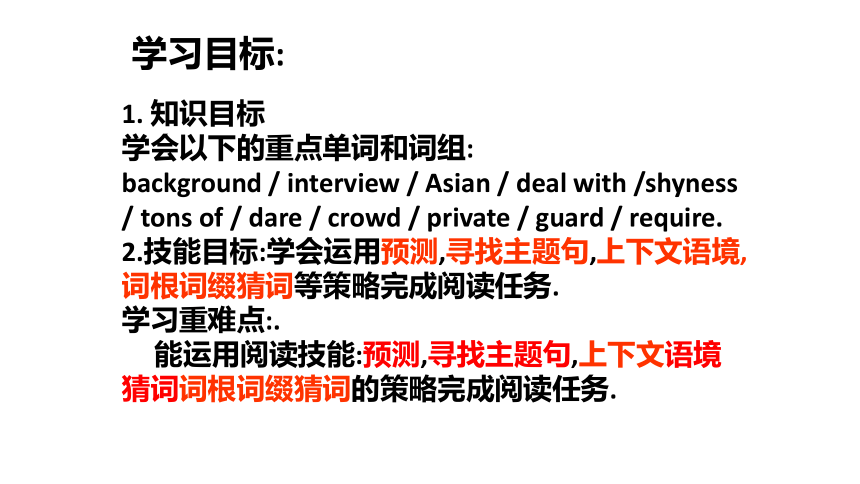
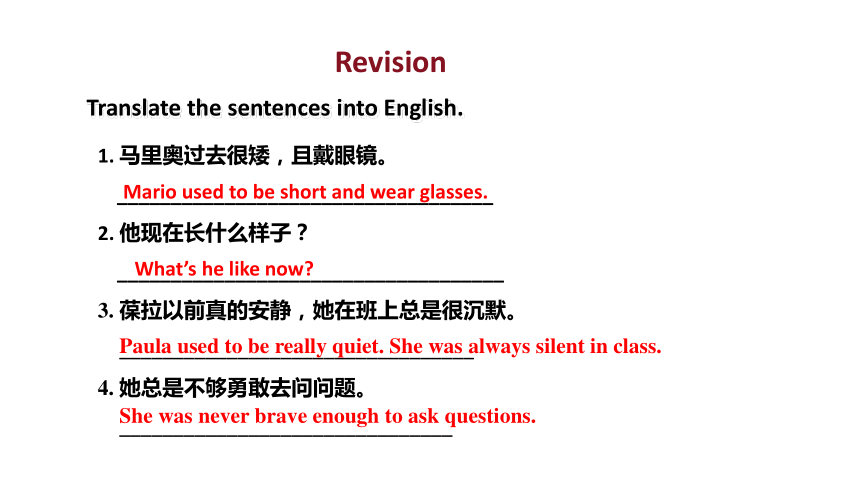


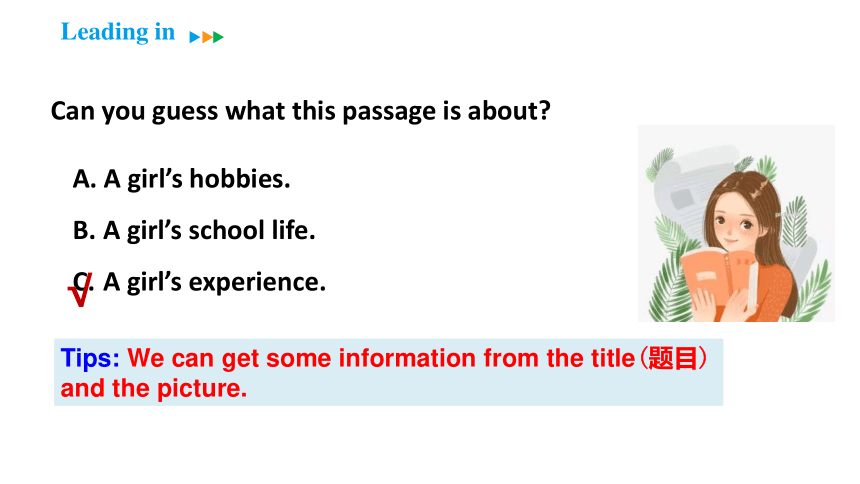
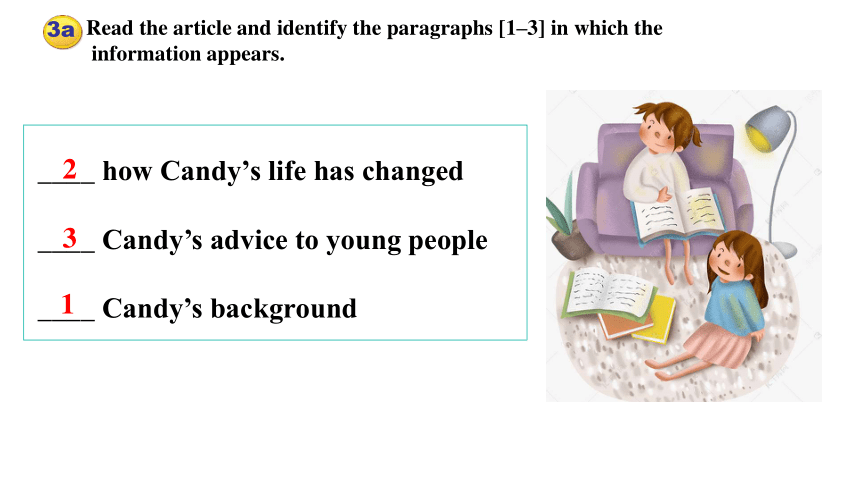
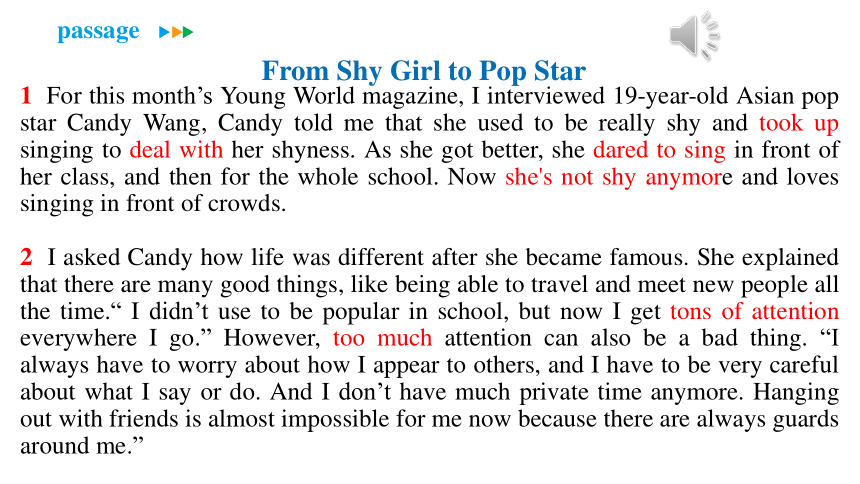
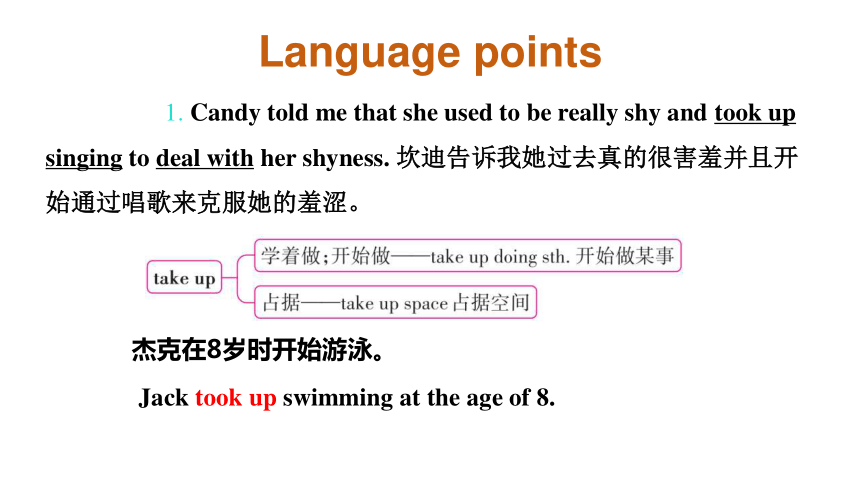
文档简介
(共24张PPT)
Unit 4
I used to be afraid of the dark.Unit 4
I used to be afraid of the dark.
Section A
3a~3cSection A
3a~3c
1. 知识目标
学会以下的重点单词和词组:
background / interview / Asian / deal with /shyness / tons of / dare / crowd / private / guard / require.
2.技能目标:学会运用预测,寻找主题句,上下文语境,词根词缀猜词等策略完成阅读任务.
学习重难点:.
能运用阅读技能:预测,寻找主题句,上下文语境猜词词根词缀猜词的策略完成阅读任务.
学习目标:
Revision
Translate the sentences into English.
1. 马里奥过去很矮,且戴眼镜。
___________________________________
2. 他现在长什么样子?
____________________________________
3. 葆拉以前真的安静,她在班上总是很沉默。
_________________________________
4. 她总是不够勇敢去问问题。
_______________________________
Mario used to be short and wear glasses.
What’s he like now
Paula used to be really quiet. She was always silent in class.
She was never brave enough to ask questions.
what did she use to be
what is she like now
From Shy Girl to Pop Star
GUESS
Leading in
Can you guess what this passage is about
A girl’s hobbies.
A girl’s school life.
A girl’s experience.
Tips: We can get some information from the title(题目)
and the picture.
√
Leading in
3a
____ how Candy’s life has changed
____ Candy’s advice to young people
____ Candy’s background
1
2
3
Read the article and identify the paragraphs [1–3] in which the
information appears.
From Shy Girl to Pop Star
1 For this month’s Young World magazine, I interviewed 19-year-old Asian pop star Candy Wang, Candy told me that she used to be really shy and took up singing to deal with her shyness. As she got better, she dared to sing in front of her class, and then for the whole school. Now she's not shy anymore and loves singing in front of crowds.
2 I asked Candy how life was different after she became famous. She explained that there are many good things, like being able to travel and meet new people all the time.“ I didn’t use to be popular in school, but now I get tons of attention everywhere I go.” However, too much attention can also be a bad thing. “I always have to worry about how I appear to others, and I have to be very careful about what I say or do. And I don’t have much private time anymore. Hanging out with friends is almost impossible for me now because there are always guards around me.”
passage
1. Candy told me that she used to be really shy and took up
singing to deal with her shyness. 坎迪告诉我她过去真的很害羞并且开始通过唱歌来克服她的羞涩。
Language points
杰克在8岁时开始游泳。
Jack took up swimming at the age of 8.
take 相关短语
take part in 参加 take place 发生
take off 起飞;脱掉 take in 吸入
take away 拿走 take out 取出
2.deal with 与do with 处理
1. deal with“处理”常与 how 连用。
How do you deal with these new problems
2. do with“处理”一般与 what 搭配使用例:
What do you do with your camera
你怎样处理这些新问题
你怎么处理你的照相机
(重点)dare v. 敢于;胆敢
(1)作实义动词,后跟动词不定式作宾语,有人称和数以及时态的变化。构成疑问句和否定句时要借助动词do 的适当形式。
3.As she got better, she dared to sing in front of her class, and then for the whole school.
她不敢跟父母顶嘴。
She doesn’t dare to talk back to her parents
(2)dare 还可用作情态动词,后跟动词原形,没有人称和数的变化,主要用于疑问句、否定句和条件句中。否定句在dare 后面加not, 疑问句把dare 提前。
他不敢当众讲话。
He daren’t speak in public.
4.Now she’s not shy anymore and loves singing in front of crowds.
not... anymore 不再,相当于no more,其中anymore 可以分开写,即not...any more。
e.g. I’m sorry I won’t throw the rubbish everywhere anymore.
= I’m sorry I will no more throw the rubbish everywhere.
对不起我再也不会把垃圾到处扔了。
not... anymore=no more 一般修饰短暂性动词,表示动作发生的次数、频率不再延续。
not... any longer= no longer 一般修饰延续性动词,表示动作、状态或时间不再延续。
He no longer lives here. = He doesn’t live here any longer.
You can drink no more. = You can’t drink any more.
辨析:not... anymore 与not... any longer
他不在这儿居住了。
你不能再喝了。
5.crowd
(1)可数名词,人群,观众
a crowd of ...一群...
crowds of...成群的
(2)动词 挤满
crowded 拥挤的
uncrowded 不拥挤的
6. I didn’t use to be popular in school, but now I get tons of attention everywhere I go. 过去我在学校并不引人关注,但是现在无论我走到哪里,都得到许多关注。
(1)
(2)
7.too many, too much和 much too
(1)too many 意为“太多”,修饰可数名词复数
例:There are too many people here.
(2)too much 意为“太多”,修饰不可数名词和动词
例:Too much work is bad for you.
(3)much too 意为“实在太...”,修饰形容词或副词
例:His new car was much too expensive.
Fun Times Park — Always a Fun Time!
3 What does Candy have to say to all those young people who want to become famous “Well,” she begins slowly, “you have to be prepared to give up your normal life. You can never imagine how difficult the road to success is. Many times I thought about giving up, but I fought on. You really require a lot of talent and hard work to succeed. Only a very small number of people make it to the top.”
passage
8.You really require a lot of talent and hard work to succeed.
require v. 需要;要求;依靠
require sb. to do 要求某人做某事(被动:sb. be required to do sth. )
require sth 需要...
require doing sth=require to be done 需要做某事(主动表被动)
The window requires repairing.
窗户需要修理。
老师要求我们努力学习
The teacher requires us to work hard.
9. Only a very small number of people make it to the top.
(高频)a small number of 一小部分 反义词组为a large number of
e.g. A small number of students walk to school every day.
特别提醒:
a number of 短语中number前可以加修饰词small 或large 来表示数量的大小。
一小部分学生每天步行去上学。
The students have a number of questions.
The number of the students in our class is 40.
a number of 意为“许多;大量”,后接可数名词复数。作主语时谓语动词用复数。
the number of 意为“……的数量”,后接可数名词复数。作主语时谓语动词用单数。
辨析:a number of 与the number of
我们班学生的人数是40。
学生们有许多问题。
填空题
1. Those _________(警卫) won’t allow the reporters to get into the building.
2. Please tell me something about the __________________(背景) of the movie.
3.The film star refused to talk about his _________(私人的) life.
4. Mary is a shy girl, She doesn’t ______(敢)to speak English in class.
5.These days we are _______________(采访)some students for the coming art festival.
guards
background
private
dare
interviewing
THANKS
Unit 4
I used to be afraid of the dark.Unit 4
I used to be afraid of the dark.
Section A
3a~3cSection A
3a~3c
1. 知识目标
学会以下的重点单词和词组:
background / interview / Asian / deal with /shyness / tons of / dare / crowd / private / guard / require.
2.技能目标:学会运用预测,寻找主题句,上下文语境,词根词缀猜词等策略完成阅读任务.
学习重难点:.
能运用阅读技能:预测,寻找主题句,上下文语境猜词词根词缀猜词的策略完成阅读任务.
学习目标:
Revision
Translate the sentences into English.
1. 马里奥过去很矮,且戴眼镜。
___________________________________
2. 他现在长什么样子?
____________________________________
3. 葆拉以前真的安静,她在班上总是很沉默。
_________________________________
4. 她总是不够勇敢去问问题。
_______________________________
Mario used to be short and wear glasses.
What’s he like now
Paula used to be really quiet. She was always silent in class.
She was never brave enough to ask questions.
what did she use to be
what is she like now
From Shy Girl to Pop Star
GUESS
Leading in
Can you guess what this passage is about
A girl’s hobbies.
A girl’s school life.
A girl’s experience.
Tips: We can get some information from the title(题目)
and the picture.
√
Leading in
3a
____ how Candy’s life has changed
____ Candy’s advice to young people
____ Candy’s background
1
2
3
Read the article and identify the paragraphs [1–3] in which the
information appears.
From Shy Girl to Pop Star
1 For this month’s Young World magazine, I interviewed 19-year-old Asian pop star Candy Wang, Candy told me that she used to be really shy and took up singing to deal with her shyness. As she got better, she dared to sing in front of her class, and then for the whole school. Now she's not shy anymore and loves singing in front of crowds.
2 I asked Candy how life was different after she became famous. She explained that there are many good things, like being able to travel and meet new people all the time.“ I didn’t use to be popular in school, but now I get tons of attention everywhere I go.” However, too much attention can also be a bad thing. “I always have to worry about how I appear to others, and I have to be very careful about what I say or do. And I don’t have much private time anymore. Hanging out with friends is almost impossible for me now because there are always guards around me.”
passage
1. Candy told me that she used to be really shy and took up
singing to deal with her shyness. 坎迪告诉我她过去真的很害羞并且开始通过唱歌来克服她的羞涩。
Language points
杰克在8岁时开始游泳。
Jack took up swimming at the age of 8.
take 相关短语
take part in 参加 take place 发生
take off 起飞;脱掉 take in 吸入
take away 拿走 take out 取出
2.deal with 与do with 处理
1. deal with“处理”常与 how 连用。
How do you deal with these new problems
2. do with“处理”一般与 what 搭配使用例:
What do you do with your camera
你怎样处理这些新问题
你怎么处理你的照相机
(重点)dare v. 敢于;胆敢
(1)作实义动词,后跟动词不定式作宾语,有人称和数以及时态的变化。构成疑问句和否定句时要借助动词do 的适当形式。
3.As she got better, she dared to sing in front of her class, and then for the whole school.
她不敢跟父母顶嘴。
She doesn’t dare to talk back to her parents
(2)dare 还可用作情态动词,后跟动词原形,没有人称和数的变化,主要用于疑问句、否定句和条件句中。否定句在dare 后面加not, 疑问句把dare 提前。
他不敢当众讲话。
He daren’t speak in public.
4.Now she’s not shy anymore and loves singing in front of crowds.
not... anymore 不再,相当于no more,其中anymore 可以分开写,即not...any more。
e.g. I’m sorry I won’t throw the rubbish everywhere anymore.
= I’m sorry I will no more throw the rubbish everywhere.
对不起我再也不会把垃圾到处扔了。
not... anymore=no more 一般修饰短暂性动词,表示动作发生的次数、频率不再延续。
not... any longer= no longer 一般修饰延续性动词,表示动作、状态或时间不再延续。
He no longer lives here. = He doesn’t live here any longer.
You can drink no more. = You can’t drink any more.
辨析:not... anymore 与not... any longer
他不在这儿居住了。
你不能再喝了。
5.crowd
(1)可数名词,人群,观众
a crowd of ...一群...
crowds of...成群的
(2)动词 挤满
crowded 拥挤的
uncrowded 不拥挤的
6. I didn’t use to be popular in school, but now I get tons of attention everywhere I go. 过去我在学校并不引人关注,但是现在无论我走到哪里,都得到许多关注。
(1)
(2)
7.too many, too much和 much too
(1)too many 意为“太多”,修饰可数名词复数
例:There are too many people here.
(2)too much 意为“太多”,修饰不可数名词和动词
例:Too much work is bad for you.
(3)much too 意为“实在太...”,修饰形容词或副词
例:His new car was much too expensive.
Fun Times Park — Always a Fun Time!
3 What does Candy have to say to all those young people who want to become famous “Well,” she begins slowly, “you have to be prepared to give up your normal life. You can never imagine how difficult the road to success is. Many times I thought about giving up, but I fought on. You really require a lot of talent and hard work to succeed. Only a very small number of people make it to the top.”
passage
8.You really require a lot of talent and hard work to succeed.
require v. 需要;要求;依靠
require sb. to do 要求某人做某事(被动:sb. be required to do sth. )
require sth 需要...
require doing sth=require to be done 需要做某事(主动表被动)
The window requires repairing.
窗户需要修理。
老师要求我们努力学习
The teacher requires us to work hard.
9. Only a very small number of people make it to the top.
(高频)a small number of 一小部分 反义词组为a large number of
e.g. A small number of students walk to school every day.
特别提醒:
a number of 短语中number前可以加修饰词small 或large 来表示数量的大小。
一小部分学生每天步行去上学。
The students have a number of questions.
The number of the students in our class is 40.
a number of 意为“许多;大量”,后接可数名词复数。作主语时谓语动词用复数。
the number of 意为“……的数量”,后接可数名词复数。作主语时谓语动词用单数。
辨析:a number of 与the number of
我们班学生的人数是40。
学生们有许多问题。
填空题
1. Those _________(警卫) won’t allow the reporters to get into the building.
2. Please tell me something about the __________________(背景) of the movie.
3.The film star refused to talk about his _________(私人的) life.
4. Mary is a shy girl, She doesn’t ______(敢)to speak English in class.
5.These days we are _______________(采访)some students for the coming art festival.
guards
background
private
dare
interviewing
THANKS
同课章节目录
- Unit 1 How can we become good learners.
- Section A
- Section B
- Unit 2 I think that mooncakes are delicious!
- Section A
- Section B
- Unit 3 Could you please tell me where the restroom
- Section A
- Section B
- Unit 4 I used to be afraid of the dark.
- Section A
- Section B
- Unit 5 What are the shirts made of?
- Section A
- Section B
- Review of Units 1-5
- Unit 6 When was it invented?
- Section A
- Section B
- Unit 7 Teenagers should be allowed to choose their
- Section A
- Section B
- Unit 8 It must belong to Carla.
- Section A
- Section B
- Unit 9 I like music that I can dance to.
- Section A
- Section B
- Unit 10 You're supposed to shake hands.
- Section A
- Section B
- Review of Units 6-10
- Unit 11 Sad movies make me cry.
- Section A
- Section B
- Unit 12 Life is full of the unexpected
- Section A
- Section B
- Unit 13 We're trying to save the earth!
- Section A
- Section B
- Unit 14 I remember meeting all of you in Grade 7.
- Section A
- Section B
- Review of Units 11-14
